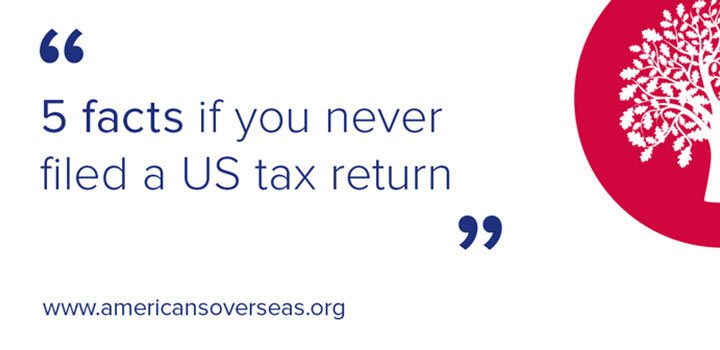
Forbes: Americans Renouncing Citizenship Because of United States tax

According to Forbes Americans living and working abroad are renouncing their citizenship because of United States tax.
The U.S. Treasury Department has published the names of people who renounced their citizenship during the third quarter of 2018. The quarterly public list is required by law.
The roughly five-year upswing in expatriations was not over one issue, but United States tax considerations are part of the equation. The reasons for renouncing can be family, tax, and legal complications.
Expats have long clamored for United States tax relief. One law motivating some is FATCA, the Foreign Account Tax Compliance Act.
What is FATCA?
FATCA was enacted in 2010, and over five years, was implemented worldwide by the U.S. Treasury Department. It now spans the globe with an unparalleled network of reporting. America requires foreign banks and governments to hand over secret bank data about depositors.
Non-U.S. banks and financial institutions around the world must reveal American account details or risk big penalties. Some were renounced because of global tax reporting and FATCA.
America’s global income tax compliance and disclosure laws can be a burden, especially for U.S. persons living abroad. Their American status can make them untouchable to many banks.
Americans living and working abroad must generally report and pay taxes where they live. But they must also continue to file taxes in the U.S., where reporting is based on their worldwide income. A foreign tax credit often does not eliminate double taxes.
Moreover, enforcement fears are palpable for the annual foreign bank account reports called FBARs. They carry big civil and even potential criminal penalties. The civil penalties alone can consume the entire balance of an account.
Even leaving America can be costly
America charges $2,350 to hand in your passport, a fee that is more than twenty times the average of other high-income countries. The U.S. hiked the fee to renounce by 422%, as previously there was a $450 fee to renounce, and no fee to relinquish. Now, there is a $2,350 fee either way.
The State Department said raising the fee was about demand and paperwork, but the number of American expatriations kept increasing.
Moreover, to exit, one generally must prove 5 years of IRS tax compliance. And getting into IRS compliance can be expensive and worrisome.
Renounce because of the United States tax
For some, a reason to get into compliance is to renounce.
However, if you have a net worth greater than $2 million, or have an average annual net income tax for the 5 previous years of $162,000 or more, you can pay an exit tax. It is a capital gain tax, calculated as if you sold your property when you left.
A long-term resident giving up a Green Card can be required to pay the exit tax too.
Sometimes, planning and valuations can reduce or eliminate the tax, but the tax worry can be real, even for those who will not face it.
More questions about United States tax for Americans living and working abroad?
We, the founders of Americans Overseas, were born in the Netherlands and obtained our American nationality through our (American) mother.
When we heard about this for the first time around 2013, we were in total disbelief (it can’t be true!), anger (how can they do this?), fear (am I going to get fined or pick up other problems?), and panic (what should I do?).
It is (unfortunately) true that there is an additional American tax levy. But there’s no information from the local government, and when approached, the consulate referred us to the IRS, and the IRS was impenetrable.
That’s why we started this initiative to help people from all over the world by providing proper information to avoid unnecessary panic and offering help free of obligation and free of charge. If needed, we have a network of affordable professionals (accountants) who can help you with your tax obligations.
If you have more questions about US income tax you can contact us at Americans Overseas
Contact us for more information
Source: Forbes
Frequently asked questions
Understanding the US tax system, the obligations, and all the additional terms can be difficult. Especially if one lives outside of America. Is your question not answered? Contact us.
-
Who is required to file taxes in the US?
U.S. citizens and resident aliens who live abroad are generally required to file a federal income tax return and pay taxes on their worldwide income.
Read more... about Who is required to file taxes in the US? -
Do US citizens living abroad still have to file taxes in the US?
Yes, US citizens are required to file taxes on their worldwide income, regardless of where they are living.
Read more... about Do US citizens living abroad still have to file taxes in the US? -
How can I cash my US check?
Received an American check? You can cash your check in the following ways: cash the check at your own bank, transfer to another person (endorsement), cash checks using an online service or cash the check by another bank.
Read more... about How can I cash my US check? -
Are there any special tax forms required for US citizens living abroad?
US citizens living abroad may be required to file Form 2555 and/or Form 1116 to claim the foreign-earned income exclusion.
Read more... about Are there any special tax forms required for US citizens living abroad? -
What is FBAR filing?
FBAR (Foreign Bank Account Report) filing is the requirement for certain U.S. individuals and entities to report their foreign financial accounts to the Financial Crimes Enforcement Network (FinCEN) of the U.S. Department of Treasury. The FBAR filing requirement applies to U.S. persons who have a financial interest in, or signature authority over, one or more foreign financial accounts if the aggregate value of those accounts exceeds $10,000 at any time during the calendar year.
Read more... about What is FBAR filing?





